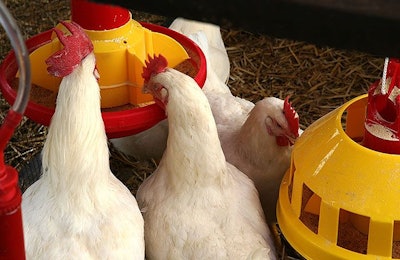
Feeding for a healthy microbiome may be a new path forward for poultry nutrition with antibiotics removed from the process.
After appearing on a panel discussing the use prebiotics and probiotics in animal agriculture at the Animal Microbiome Congress USA in Overland Park, Kansas, in March 2018, Tyson Foods Inc.’s Dr. Scott Gustin spoke with WATT PoultryUSA about his company’s use of feed additives and his views of the emerging field of microbiology in animal agriculture.
Gustin, director of veterinary services for Tyson, said the integrator’s use of probiotics dates back 10 years. Tyson is the largest integrated poultry company in the U.S., and all Tyson-branded products are raised no antibiotics ever (NAE).
In the interview, Gustin said the eventual goal is to feed birds to establish and maintain a healthy microbiome. It’s uncertain what exactly that is, but those studying the subject are making rapid advances due to ever-improving and cheaper technology. This article is an edited transcript of the interview.

Dr. Scott Gustin, director of veterinary services for Tyson Foods Inc., speaks at the Animal Microbiome Congress USA. | Photo by Austin Alonzo
How do you differentiate between a product that isn’t going to work for Tyson and one that will work?
We take a multi-tiered approach. We have a technical team of scientists, veterinarians, nutritionists, so we’re going to see if it makes some sense and if there’s a mode of action – whether it’s promoting good bugs or it's actually killing or inhibiting bad bugs. The things that we’re looking for are: Has it been properly vetted through private research, a university study or some type of a challenge trial? What is the intended purpose? What backing does it have? We conduct our own kind of head-to-head studies with products internally and then there’s always the field evaluation.
It really depends on if the product is specified to work, for like necrotic enteritis, or is it more just a general performance or for food safety? Those are the hoops they have to jump through for it to make sense to us or at least stand out from all the other stuff. We use a lot of alternative products, but we’ve tried to do our homework and proper vetting on all of them.
How have things changed with the steady removal of antibiotic growth promoters and ionophores?
For most of our product, ionophores are out of the picture. All Tyson-branded products are (no antibiotics ever). Has it changed? I don’t know. We’ve transitioned in this direction for so long. I don’t know that it’s changed. We’ve tried to keep current with what we’re doing and that it fits and that we’re not missing anything else out there. We’ve tried to do customized approaches for complexes with, I’d say, varying degrees of success.
Is Tyson using a case-by-case approach for using feed additives like probiotics?
We’ve gone with the approach that we’re going to do this as a company. But we’ve tried certain complexes on some of these customized approaches through feed. I think where the case-by-case stuff works is on certain farms developing water-soluble interventions that would work for those farms. Obviously, if you stick it in the feed, it’s a different ball game. There’s a lot of cost and, honestly, we just haven’t seen where these customized products have fit the bill. It all makes sense, but it just hasn’t panned out.
On probiotics, have you got a formula that you like? Have you "figured it out"?
I think we’ve settled into a comfortable place, but we’re always looking. Probiotics are a piece, prebiotics are a piece as are organic acids – we use a lot of phytogenics or essential oils. We have a good baseline now. We’ve been through some of the growing pains of antibiotic-free, so we’re always going to try to look for something a little bit better and less expensive.
What do you think of this field of microbiology in animal agriculture? What does the science mean to you as a veterinarian?
We’re starting to understand – in the small animal and even ruminants and swine – I think they’re really starting to be able to understand more of the pathogenesis behind certain disease through shifts in the microbiome. I don’t think we’re there yet in poultry and maybe it’s because necrotic enteritis is such a fast moving disease.
What I took away from (the Animal Microbiome Congress) is that they are getting pretty close in other animal species. I think that’s really valuable, because you’re talking about taking non-invasive samples and you can recognize some things that maybe haven’t made any sense previously, and you can apply a remedy that maybe isn’t what you thought it was. It’s not the typical, "Here’s a pathogen, let’s take an antibiotic and go and kill it approach." Maybe we need to support something, or maybe there’s a different product that can make a shift that we want that’s going to give us a good outcome.
Read more:
Gut health vital to antibiotic-free poultry production, www.WATTAgNet.com/articles/25723

















